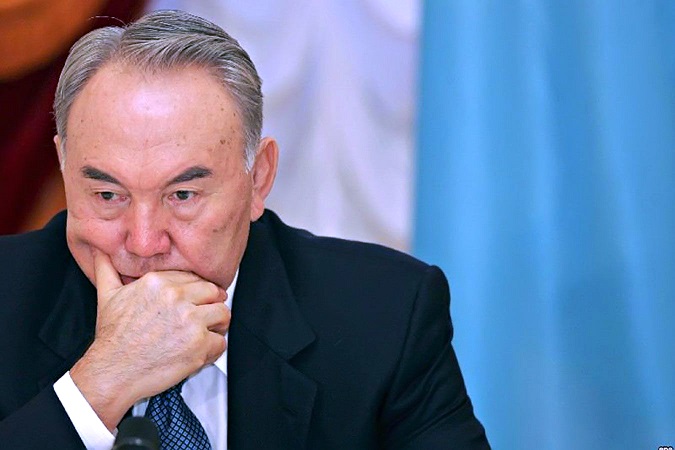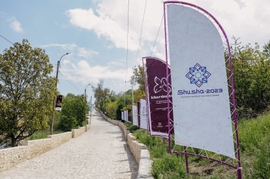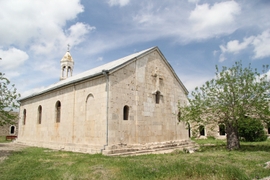Kazakhstan is preparing for a major linguistic reform, akin to what Mustafa Kamal Ataturk, the founder of modern Turkey, did for the Turkish language in 1928.
In a televised interview broadcast on August 17, President Nursultan Nazarbayev urged the government to speed up what will be a nationwide transition that will see the Kazakh language go from using a Cyrillic alphabet to a Latin-based one.
“The transition to the Latin alphabet does not mean abandoning the Russian language, the Cyrillic alphabet. The Latin script will primarily concern the Kazakh language. All publications in Russian will continue to appear in Cyrillic,” Nazarbayev said. His plan calls for the transition to be complete by 2025.
“I think we should not drag out this issue. Our scientists should study and determine samples we need, by studying the Turkish alphabet and the alphabets of countries, such as Azerbaijan, Uzbekistan, which previously switched to the Latin alphabet, taking into account their shortcomings, it is necessary to compile our own alphabet,” the president said in Astana in June.
Russian holds the status of an official language in Kazakhstan, which was ruled by the Soviet Union between 1920 and 1991. After the Red Army marched into Kazakhstan nearly 100 years ago, Russian cultural and linguistic influences were rapidly disseminated, although language was something of a hold-out: By 1927, Kazakh went from being written in an Arabic script to using a Latin alphabet introduced by the Soviets. By 1940, Moscow changed course and introduced Cyrillic to replace the Latin script in order to help cement Soviet and Russian influence in Central Asia.
Kazakh is one of 23 Turkic languages, making it closely related to languages such as Turkish, Azerbaijani, Turkmen and Uzbek, and is thought to be better suited to using a Latin script, given its complex vowel sounds that have poor or no representation in Cyrillic, which is native to Russian, Ukrainian and Slavic languages.
"The switch to Latin is not a whim. It is the spirit of the time. When I speak about a strong state, I mean robust citizens. It is necessary to know the international language, English, because it is the backbone of all advanced technology,” Nazarbayev said earlier this year.
In April, Nazarbayev announced his plans to orient the Kazakh language to the west by introducing a Latin alphabet, ordering the government to come up with a clear timetable for adopting the Latin script by the end of this year.
“There is a profound historical logic behind the transition to the Latin script,” Nazarbayev wrote in the state-owned Egemen Kazakhstan newspaper. “It includes the current state of the technological environment, communications in the modern-day world, and specifics of science and education in the 21st century."
Not all Kazakhstanis, who number over 18 million and include 24 percent ethnic Russians, are enthusiastic about the coming change.
“I hear various fears, but we will not move away from Cyrillic. We will not forget Russian culture and the Russian language. We learned world culture using the Russian language, and it will always remain with us. Our neighbor is always near us and we will always cooperate with it," Nazarbayev said recently, trying to quell concerns.
Some see the move as a way for the government in Astana to minimize the Kremlin’s influence on the country’s northern areas, bordering Russia and more heavily populated with ethnic Russians.
"The switch to Latin today is evidence of a long-term trend which shows that Kazakhstan does not belong to the Russian world in full," Professor Aleksandr Gushchin at Russia's State Humanitarian University said in an interview with Politcom.ru in April.
Kazakhstan has always avoided moves that could anger Moscow, which is very protective of ethnic Russian populations living outside the borders of the Russian Federation. Russian observers interpret the move as an attempt by officials in Astana to detach Kazakhstan from its Soviet legacy and the Russian sphere of influence.
“For Russia, the linguistic move is a hint that it should be more compliant about issues relating to mutual economic interests," Sultanbek Sultangaliyev, an independent political analyst, told Caspian News. "Russia's actions in the international arena in the past few years make former Soviet republics afraid of being absorbed by the Russian world, and make them look faster for new allies," he added.
Nazarbayev's plans are unlikely to please Russia, which sees Kazakhstan as one of its main allies. The Kremlin has always been keen on promoting Russian language and culture throughout the former Soviet states, and Cyrillic remains an important medium for achieving that objective.
"There are domestic political reasons behind this move,” said Russia and Central Asia expert Arkadiy Dubnov. “Such a step will allow President Nazerbayev to receive the support of the part of the population and the elites who strive to detach themselves from the Russian world, and who value national identity more.”
"We are starting to think about our own existence in a new manner. Choosing an alphabet is like choosing one's destiny," Aydos Sarym at the Kazakh National Library Caspian News. A new generation of people will appear in a while who will study using the Latin script and it will be as easy for them as it is for us now in Cyrillic," he added.
But some of the experts interviewed are skeptical about Nazarbayev's and other Kazakhstani leaders’ true intentions.
“My attitude towards the transition to the Latin script is skeptical,” Sultangaziyev said. “It is simply a project for spending budget funds on a grandiose scale which is being pushed through by interested groups.”
"Don't expect Russian speakers to resist this truly dramatic language reform. It's easier for them to leave, and that’s what they will do," he added.







 President Ilham Aliyev shed light on the evolving contours of the peace process with Armenia during an international conference in Baku this week. ...
President Ilham Aliyev shed light on the evolving contours of the peace process with Armenia during an international conference in Baku this week. ...
 Azerbaijan and Armenia started the process of demarcation of their border on Tuesday, with the installation of the first border markers based on ge...
Azerbaijan and Armenia started the process of demarcation of their border on Tuesday, with the installation of the first border markers based on ge...
 Armenian sappers commenced on Monday mine-clearance operations in the territories adjacent to the Saint Mary Church in village of Voskepar (Armenia...
Armenian sappers commenced on Monday mine-clearance operations in the territories adjacent to the Saint Mary Church in village of Voskepar (Armenia...
 Iran and Pakistan have signed eight cooperation documents in various fields, and agreed to strengthen ties to fight terrorism in the region.
Iran and Pakistan have signed eight cooperation documents in various fields, and agreed to strengthen ties to fight terrorism in the region.



